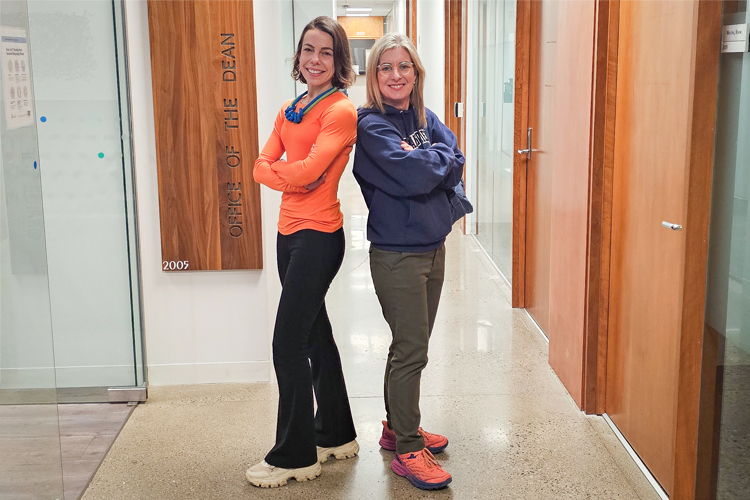Even though it isn’t her first language, Camila Justino has dreams of one day being a published author in English — and she’s sure her U of T education is a giant leap in the right direction.
An author in Portuguese, Justino was mostly focused on raising her first child when she came to Canada from Brazil. Realizing her beginner English language skills were holding her back here, she pursued an honours bachelor of arts in book and media studies with a double minor in medieval and Celtic studies as a member of St. Michael's College. In doing so, she hopes to learn and develop her English skills without erasing her culture or mother tongue.
“I believe non-native speakers have a beautiful, creative and invigorating way to speak and write in English,” she says. “We should always celebrate ‘languages in between’ instead of correcting the so-called broken English.”
Her time at U of T was invigorating, she says, and even included a stint as dean of the Faculty of Arts & Science for one day. She’s now pursuing her master’s degree at U of T’s Women & Gender Studies Institute.
What brought you to U of T?
When I moved to Canada from Brazil, I was not proficient in English. I decided to prepare myself to start an undergraduate degree so I could evolve my English language skills in a community learning of excellence and write my own experiences. It had to be U of T, the best university in Canada!
U of T opened the doors for me, welcoming my experience and my language ‘in-between.’ My years at U of T were transformative, and I gained more energy and support to embrace writing in English, even being a non-native speaker. I started to learn English after my 20s!

What activities did you participate in outside the classroom?
I did participate in a few activities outside of the classroom, although I loved to spend time exploring books in solitude in the libraries of the campus, particularly at Kelly Library. I had the opportunity to have an international experience as a student of the Boyle Seminar in Scripts and Stories offered by St. Michael’s College, and our group had the chance to travel to Ireland to see special manuscripts, explore Dublin, and visit an archaeological sites in Trim with the students of the Blackfriary Archaeology Field School.
Another remarkable experience was serving as a student representative on the St. Michael's College Senate Committee. I was also the editor-in-chief of the Foolscap, the academic journal of the Book and Media Studies Program, and it was an incredible experience to work alongside other students to create a digital journal to voice many of our questions on living in a world surrounded by media.
I also participated in meetings with friends of the Pontifical Institute of Mediaeval Studies Library, and it was delightful to get involved and learn from the students, scholars and professionals that make the institute such a special place with rare manuscripts and collections.
You mentioned you are heading to the Women & Gender Studies Institute. What do you hope to after earning your next degree?
I hope to explore and work on themes of immigration and how communities that don’t have English as their native language navigate the world outside of their own land and mother tongue —particularly women! I am excited about what I will learn as a graduate student at the Women & Gender Studies Institute.
Do you have a favourite lesson or take-away from your time this far at U of T?
I have learned many lessons from these years as a student of humanities at the University of Toronto, and one of the lessons I carry with me is an obvious one: life is hard, and we all go through many hardships. We study and can become more aware of how the world can be challenging, especially for underrepresented voices.
However, surrounded by a generous learning community and its tools — something U of T provided me— I got to know the challenges of the world, but I also learned something that is not so obvious: I can have agency and use my language with hope and courage to collaborate on new narratives and stories. “Radical hope is a refusal of what is and a reaching for an otherwise made in joy,” and this is something I learned with Professor Dina Georgis.

